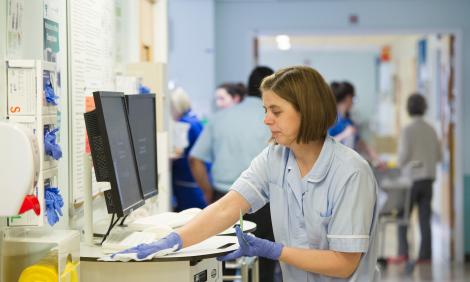Domestic services
Domestic services staff make sure hospitals are clean, comfortable places and prepare and serve food for patients and staff.

Food and catering
Food is an important part of patient care. Patients who stay in hospital are happier with hot delicious food and get better if fed well. Food can be part of the treatment, too, for patients on special diets. So food has to be nutritious, inviting and served on time. Hospital staff need to eat as well, so many hospitals have a staff restaurant. Some also have a café where visitors can get hot drinks and snacks.
Roles include:
Keeping things clean
It’s also important that hospitals and clinics are kept clean. This makes them welcoming places for patients to be treated and stops infection spreading. You could work in:
Hospitals rely on domestic services round the clock so working in domestic services means working shifts. Early starts in particular are needed so that breakfasts are ready on time and offices and corridors are cleaned ready for the day’s work.
You can often enter domestic services jobs with few or no qualifications. Once in the job, you will be encouraged to take qualifications. This will help you progress, if that’s what you want. You could become a team leader looking after a team of assistants. Managers in catering, domestic services or linen services often start as assistants.
If you already have a qualification and experience from elsewhere in, for example, catering or hotel services, you could join the NHS as an assistant manager or manager.
Wherever you work in domestic services at whatever level, customer service is the focus. Many domestic services assistants have contact with patients as they deliver food or clean linen to wards. You could use your customer service experience to help make patients’ hospital visits more pleasant.
-
Catering managers are responsible for the catering in a hospital. They plan menus with clinical staff so meals are nutritious and cater for special diets. Managers order supplies and make sure chefs and cooks know what meals they are making each day. Managers recruit and train staff and organise rotas to make sure there are enough staff on each shift. A big department has assistant managers who work for the senior catering manager.
Chefs and cooks prepare food according to the menu plan for each day. They have to make sure that each meal is prepared and served on time, with as little waste as possible. A big kitchen might have a head chef or cook with several assistant chefs. Some catering assistants work in the kitchen preparing food or washing up. Others serve food at the counter in the staff restaurant or visitors’ café. Some assistants take trolleys of hot food to wards, where they serve meals to patients.
-
Domestic services staff keep hospitals, clinics and offices clean. Managers are responsible for services in a hospital or area, recruiting and training staff and organising rotas. Domestic services assistants keep wards offices and public areas clean and tidy. They do routine daily and weekly cleaning as well as responding to emergency spills.
Housekeepers work as part of the ward team, making sure that patients have a pleasant, safe stay in hospital. The ward manager may ask the housekeeper to do non-clinical tasks such as reassuring patients, receiving visitors or serving meals. They may also do some administrative tasks such as ordering transport or updating records.
-
Linen services staff make sure that wards and clinics have supplies of clean linen and uniforms. Assistants collect soiled linen in bags and trolleys to send to the laundry. Some hospitals have a laundry on site, where linen staff use washers and dryers to clean, press and pack the linen. Managers organise linen services, controlling stock and making sure quality standards and turnaround times are kept to.




